We got back from Italy, with heads spinning.
It's hard leaving it.
On the flight back I picked up a well marked copy of Faustus by Goethe that dad read at Harvard in 1963, perusing the dedication:
“My bosom thrills, with youthful passion shaken,
From magic airs that round your march awaken.
Of joyous days ye bring the blissful vision;
The dear, familiar phantoms rise again,
And, like an old and half-extinct tradition,
First Love returns, with Friendship in his train.
Renewed is Pain: with mournful repetition
Life tracks his devious, labyrinthine chain...”
Goethe famously rejected Berlin.
But it seems he understood something of the “devious, labyrinthine chain” that might lead us here, “phantoms rise again.” I feel them riding here, walking at night, taking the tram, the S and U bahn.
Each day, we explore the nooks and crannies, the restaurants and museums, looking at what it was, the darkness and light… the vast expressive reaction, the possibilities, the geist of the place. The trauma of history is always here, but so are the expressions of care.
I stumble upon a squat, Line206 in Mitte, with a banner out front, in solidarity with all oppressed people; “My body my choice,” declares another. The odd thing is watching this relatively stable place which embraced its worst instincts, having bounce back, wondering about the United States, which seems to be teetering on the edge, playing footsie with fascism, leaders of one of its parties bashing immigrants and outsiders, with threats of violence and retaliation. Many in the US are trying to right the course of history, the debt forgiveness,with all its ows movement roots, and climate action finding support in Washington. Hopefully the right has over reached and we see a turn toward something more abundant.
Is it too late?
Have we reached a tipping point?
It's a topic Caroline and I debate every day.
Each day, a different surprise opens as we ride.
I find myself riding down Greifswalder Str looking by a statue of Ernest Thälmann, a communist leader from the Weimar Republic; antifascist, held in solitary until he was shot on Hitler’s request in 1944. Throughout the Weimar years, he battled for a different kind of socialism than what took over Germany in the 1930’s. He paid a painful price for doing so. Today, the statue of him includes the word “Held.”
My friend Alessandra Rusconi posted, ps in case you are wondering "held" means hero in German.
You feel the history on every corner.
You also feel the reaction to the darkness.
I think about Matteo and Italy and Mussolini who flew from Italy wearing a dress.
They caught him, hanging him upside down.
The day after our return from Italy is the first day of junior year for the teenager in Berlin. I hope they keep on smiling like they did in Italy. First an orientation, yet another of many, many years, schools; growing up happens at a snails pace. Then zip, 16, two years and high schools over. Wow. Don't grow up too fast little one. The first full day, we zip through three connections to get there. The trains are still tagged, splashed with paint, photos about underground connections between East and West, the Revolutions of 1989, steeped with history before I am unceremoniously booted from the trip.
Caroline loves it, glad to be away from the crazy USA.
She keeps ordering in marks.
“Three marks. I’m gonna keep saying it.”
Later, we meet up with the kids and Dom, a friend from the USA, for a snack in Kreuzberg.
And then to the midnight showing of Rocky Horror picture show.
More participatory than any show I've seen in the US in years.
What is it about this city of expats and artists, libertines and party people?
Each day a separate set of adventures, looking for the geist.
There seem to be hundreds of cemeteries and museums to explore.
Sunday, we bike to flohmarkt kranoldplatz. The flea market is an "art and second-hand market" according to §4 Abs.1 Nr.5 of the Berlin Shop Opening Act. The sale of second hand, junk, vintage clothing, collectibles, handicrafts and used objects of daily life is permitted.… The sale of industrially manufactured new goods, new CDs/DVDs and new videos, etc., pornography, goods intended for consumption (e.g. food, cleaning and detergents), weapons, Nazi rolls, explosive explosives, drugs, live animals, stuffed animals, fur coats is not permitted…”
We grab some lunch at a lovely little Austrian restaurant, eating at a table outside, covered in red and white checkered tablecloth. Two fave things in one shot... Steigel pils and Mon Amor....!!!
And then bike to Hopskotch Bookstore and off to the Neue National Gallery, exploring the melancholy of a Weimar family portraits, seeming to sense something is wrong, a vibrant culture on the cusp. There is Sonja, perhaps the greatest portait, among a national collection, looking at the transformation of art and consciousness, a reactgion to trauma and terror, my old heros Kokoshka and Beckman, unpacking exposing it.
On we walk, taking in the Collection Catalogue for Works from 1905 to 1945:
Looking through the show, we are left to wonder about those days before the darkness, the Weimar era openings, the dreams, the artists canvases, questioning what is reality, the trauma and destruction that followed, the storm.
It's everywhere.
You see in people’s clothes, the goth outfits on the train on the way to the Bauhaus show at Zitadelle Spandau – at Berlin's Citadel on August 22, 2022…” Bauhaus in Berlin, we could see the people in black, ten stops away on the subway to the show. I didn't know they were still going. In the 1980's, I loved them and Love N Rockets,the band that followed. Murphy had has troubles. The world changed. And so did music. But here we are singing along... Undead undead undead. An elder woman starts crying when they play Bella Lugosi's Dead. A man in front buys me a beer when we hold his place. Majestic, in the flatfield, the passion of lovers,dark entries, reminding us, dark goth, vampire novels, and pop, something dark inside.
Back at the flat, the second cat Spider, who we brought from the US, is getting sicker and sicker, possibly dead, undead. We get him help. The hospitals are banned from over charging.
Some days, it slows.
And then the teenager unpacks something else along the road, on the way to a lost skatepark .. a lonely hospital .. a new school... A subway through the m s and u trains... Dreaming in another language....
The DIY Skate Park, Greifswalder D.I.Y., is a bit like New Orleans, says the teenager,exploring secret spaces here... New ideas built on the ruble of the old city.
Danny welcomes us, telling us about the rules of the space.
This is my living room, he says, reminding us the space works according to FLINTLANDA DIY rules, no hitting on people; you have to say hi.
You can’t get in here without a guten tag.
He’s glad he’s been part of creating an open space, such as this.
Another member, Johannes Hirschmann tells Jonathan Hay about the space:
“Finding a name for the spot was one of the most unpleasent and unimportant jobs on the list. To make things short, you could say the spot is called “Greifswalder D.I.Y.” because it’s right next to the train station “Greifswalder Allee”, more or less in the center of Berlin. Telling when the build began is hard to say, because different people already built one or two ramps eight years ago. The property was hard to enter back in the day, and word was it that the whole place was about to be torn down very soon. So there was no regular building happening until three years ago, when the Müsli-Gang und the Shake-Pfand guys put their heads together and decided to start building ramps at the spot. Since then, a lot of things changed on this precious property because the guy that owns the place made it more open for the people by tearing down the fence and getting different parties to rent out certain parts of it. One of these parties is a collective of people running a subcultural place containing a techno club, art exhibitions, a circus and a lot of other awesome stuff. They helped us out a lot, which formed a big friendship between these different parties. Anyway, the landlord didn’t open the place for us on purpose, we we’re just an unpleasant side product that developed without him really recognizing. Now he has obviously recognized, and still tolerates the skaters, not without making things difficult for us, but this is another story.
How is it working on the spot in the harsh northern german winter or did you take a break through the winter?
Basically there is no winter break. The last few years we were blessed with a mild winter and just continued building and skating as good as possible. This winter we had two weeks of snow, so we just made the best of it and had some little snow-skate sessions, everything with only a very small group of people, due to the lockdown situation, of course.
How does it look for the future of the spot?
We hope the future is bright! We’re working on it for sure! There is more building to come, but apart from that we want to expand the social aspect of this project. Everything will stay non-profit, but we would like to give something back to skateboarding and the culture. Working with kids, getting them off the street into an environment in which they can learn new things. It doesn’t matter if it’s about skateboarding, building, growing plants or whatever. This place is a D.I.Y. skate park and a big playground for people of all age, all gender and origins. We will fight for it until the bitter end, and make the best of it!”
I try to make sense of it all at my new Berlin desk, for writing and daydreaming over the next year.
Writing stress.
The terror.
Every once in a while home grips me.
I miss the sensuality of Italy.
Dinner with Scott and Frederico, on Wednesday, we chat about Berlin and politics and art, what can be done, the surrealists and collective failures.
Marc arrivs and Spider survives.
Peter Murphy's voice echoes through my mind...
Undead undead undead, all of us on our journeys through the city, through time…
It's Howard Zinn’s birthday.
He reminds us of a useful activist praxis.
James Tracy recalls:
“On Howard Zinn's birthday, I thought I would share a Zinn story demonstrating what a wonderful person he was.
About 2004ish I attended the National Association of Street Newspapers conference at Boston University. Howard was to give the keynote address. The only problem is that someone forgot to unlock the room where he was to speak. While a custodian was tracked down, Howard held court outside of the room, hanging out and joking around with mostly formerly and currently homeless people. I immediately noticed how he was doing a lot more questioning and listening than talking.
One woman, who I think was from Atlanta, asked if she could tell a story about her first organizing victory. Howard welcomed her to do so. She talked about how she and other women organized to get their city to give free bus passes to those on aid who were looking for work. I don't remember all the details, but I remember how proud she looked. "That's our slice of People's History," she said.
Before Howard could respond, some dude started lecturing everyone about how this woman's story was meaningless. That we should all stop looking for "reforms" and only focus on "revolution." As if those things are not bound up with each other anyhow, more than anyone wants to admit. The dude was rude, dismissive and loud about it.
Howard handled his business like a pro. Instead of getting into a long quicksand debate, he just said "Son, big revolutions often start from small ones." He hugged the woman who shared the story. Then, the room was unlocked and his keynote began thereafter.
That's how you do it. Invite people in. Shut bullshit down with a smile.
Happy 100th Howard. Your work lives on.”
The next day, Marc and I head out early exploring a few of my fave places in Berlin, a cemetery holding an art opening Friday, a bookstore with wonderful holdings, an art gallery, a bike ride through the city. Cheers to @hopscotchreadingroom and friends…Marc takes me to explore the “No Master Territories” show at HKW, “Feminist Worldmakeing and the Moving Image.”
HKW is the Haus der Kulturen der Welt, theHouse of the World's Cultures, a center for international arts. Outside, we sit under the trees, talking about his life here and in California, where it most feels like home.
Marc and I talk about the history of post war art here.
“Joseph Beuys, before him they were screwing around… Look at the 1971 Hans Haacke stuff,” says Marc, the gentrification pieces, hanging with Allen Moore, preceding the real estate show.
Friday, my usual Thursday meeting buddy Kevin is passing through town.
We meet for a few hours at Frankfurter Allee, one of the oldest roads of Berlin. It extends the Karl-Marx-Allee from Frankfurter Tor. Over a few pints, we commiserate about the road, talking about his adventures with the mermaids in Rome, along a radler between Milan and holy Brooklyn. Cheers.
Rain pours as I pedal to Kreuzberg to meet the Dada obsessed teenager at
Berlinische Galerie, a museum of modern art, on Alte Jakobstraße, not far from the Jewish Museum.
Even the bookstore, where the teenager meets me, is pulsing with ideas. Before the permanent exhibition, we explore current exhibits on photographer Sibylle Bergeman and Tabea Blumenschein Ulrike Ottinger. Nan Goldin eat your heart out.
It's our favorite museum in Berlin so far.
Finishing, we stop for a kaffee und kuchen.
That is the best cake in Berlin, says the cute gentleman who sells us our coffee and cake. Love art all day... And delicious cake before an art opening in a cemetery.
And make our way out into the rain to Frieda Im All, a vintage boutique right by the Kit Kat Club, selling classic and trash wares.
Their owner has a Tank Girl tattoo on her arm.
The teenager gets a good deal.
They chat about it all.
Frieda tells us she’s worried about Berlin. The city costs too much, she says, lamenting $600 rents that disappeared in New York decades ago. With people around the world flocking to sensible Berlin, it's a matter of time before those prices sneak up as they have everywhere else.
The teenager and I ride up through Alexanderplatz.
They have an art opening as do I at Verwalterhaus in die Prenzlauer Allee 1 ein:
“DIAGONALE/4
TRANSFINITY
27.8. – 8.9.22
In times of serious crisis, it is said, people remind themselves of higher ideals, that is, values that the world currently lacks. Our world is here – the horizontal; art is usually there, in other, special or separated places – the diagonal; and high above all is the sacred – the vertical. Artworks of the Diagonale/4 point to the vertical. Different artistic approaches and various artistic means create perspectives, questions and answers around it. Modern art has always operated diagonally, mediating between heaven and earth, recording or passing on diagonal experiences. These encounters are in the transfinite, intermediate zones finite-infinite, profane-sacred, horizontal-vertical. Just diagonal.
VERNISSAGE
Performances by Shona Stark and Anissa Taibi
26.8. 19-21h
OPENING HOURS
Thu–Sun 16–19h
Verwalterhaus
Prenzlauer Allee 1…”
Most of my friends in Berlin, Neils, Frederico, Alessandra, Scott, and company are at the show.
Turns out, the teenager is going to the same opening.
Inside, the gallery, they are selling deep glasses of cheap white wine.
Inside the exhibition, it's hard to tell what's the art and what's a ruin of the space itself.
“Who are you?
What do you do?
Have you had enough?
Have I gone too far?”
asks Shona in her performance in the cemetery in the rain.
I stay as long as I can, drinking beer with my friends, before the day catches up with me.
Riding my Berlin high, news from New York reaches me.
Finally visiting his sister on the beach, Mel made his way into the water, for his final departure.
Maybe its better I’m not in NYC for this one,
No trips to Mels after Judson this fall as I did all last year.
That warm greeting is gone.
Broken heart.
Riding to another show, Saturday, we stumble upon the most exciting demo I’ve seen in years.
Cops lead us there.
Hello Berlin, we discover, a housing rally, rave for bodily autonomy and love.
Rave music and bubbles fly through the air.
Mel S. Rip. Almost feels like home seeing all the cops leading to the demo on Karl Marx Allee. What isn’t familiar with the police cleaning up for all the broken glass.
Free Lina graffiti are ubiquitous.
On we ride.
At the gallery, Hong Kongers display works about forming communities,
“Living somewhere else is always a complicated situation,” says the gallery material for Forming Communities Berliner Wege…. “neither here nor there.”
It's almost too much.
Somehow it all starts to feel strange.
Back we zoom.
I go to bed watching Cassablanca, wondering what those lost souls, still trying to make it home.
Flea Market Sunday, we make a trip to peruse the junk at The Mauer Park, looking through the junk of lost lives, used shoes, from lives long passed.
Stroll up to see the graffiti artists painting the remains of the wall.
Better than any new galleries, says Caroline.
And off to the movies...Der Himmer uber Berlin at Lichtflick Kino.
It's perhaps my favorite movie these days, along with M and Caligari.
I watch it over and over, imagining another city, and this city.
The tickettaker has a hard time taking cash, or making change.
The movie starts as In the Mood for Love.
I thought it was Wings of Desire, says the man in front of us.
The tickettaper fixes it.
And we settle into our story of cold war Berlin, lost between its past, angels in the skies as its conscience, an ever amiable detective, a trapeze artist fretting about the future, and her life, her longing, and Homer, the storyteller recalling the bombed out buildings of Potsdammer Platz where he sits.
Nick Cave plays and Bruno stumbles into his artist, flying high, descending, lightness, unbearable, flying, through the sky.
I thought it was going to be just another boring black and white movie, says the teenager, who loves it.
Back we make it home for a quick dinner before theater.
Wish me luck with Antigone in German at Theater under One roof, i post.
Some of the most compelling theater in years, the Tragedy of Antigone offers a mirror of what has been lost, with walls rising, fortress Europe, refugees turned around on trains, bodies piling, pouring on the shore, reminding the world.
“It is the dead, not the living, who make the longest demands.”
Sophocles’ 441 BCE tragedy of civil war, points us.
“I was born to join in love, not hate - that is my nature.”
“I have no love for a friend who loves in words alone.”
“Tomorrow is tomorrow.
Future cares have future cures,
And we must mind today.”
“Leave me to my own absurdity.”
Sophocles, Antigone…
We are no closer to finding the geist of Berlin.
We’ll keep on looking.








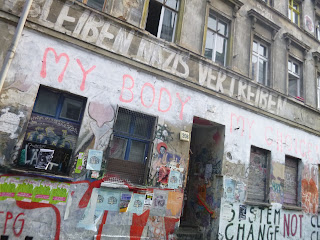

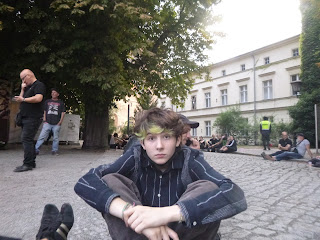




























































































































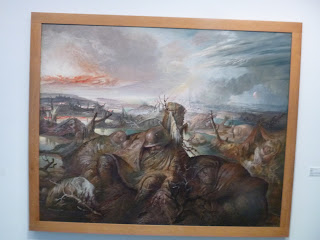

















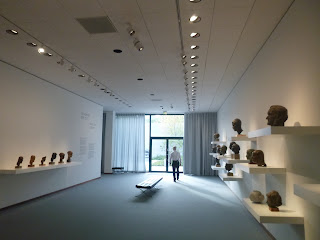





























































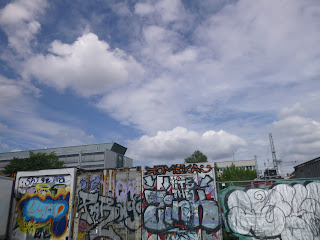



























































































































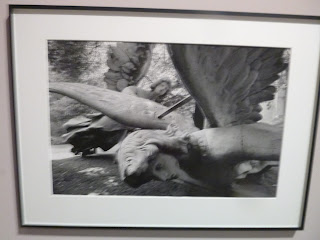





































































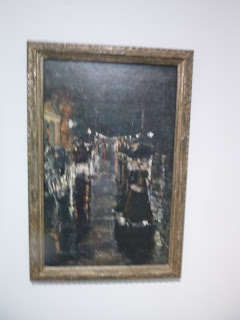






















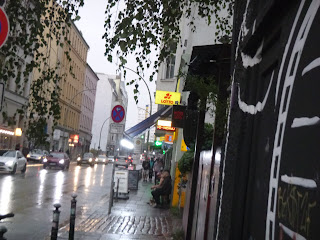






































































































































No comments:
Post a Comment